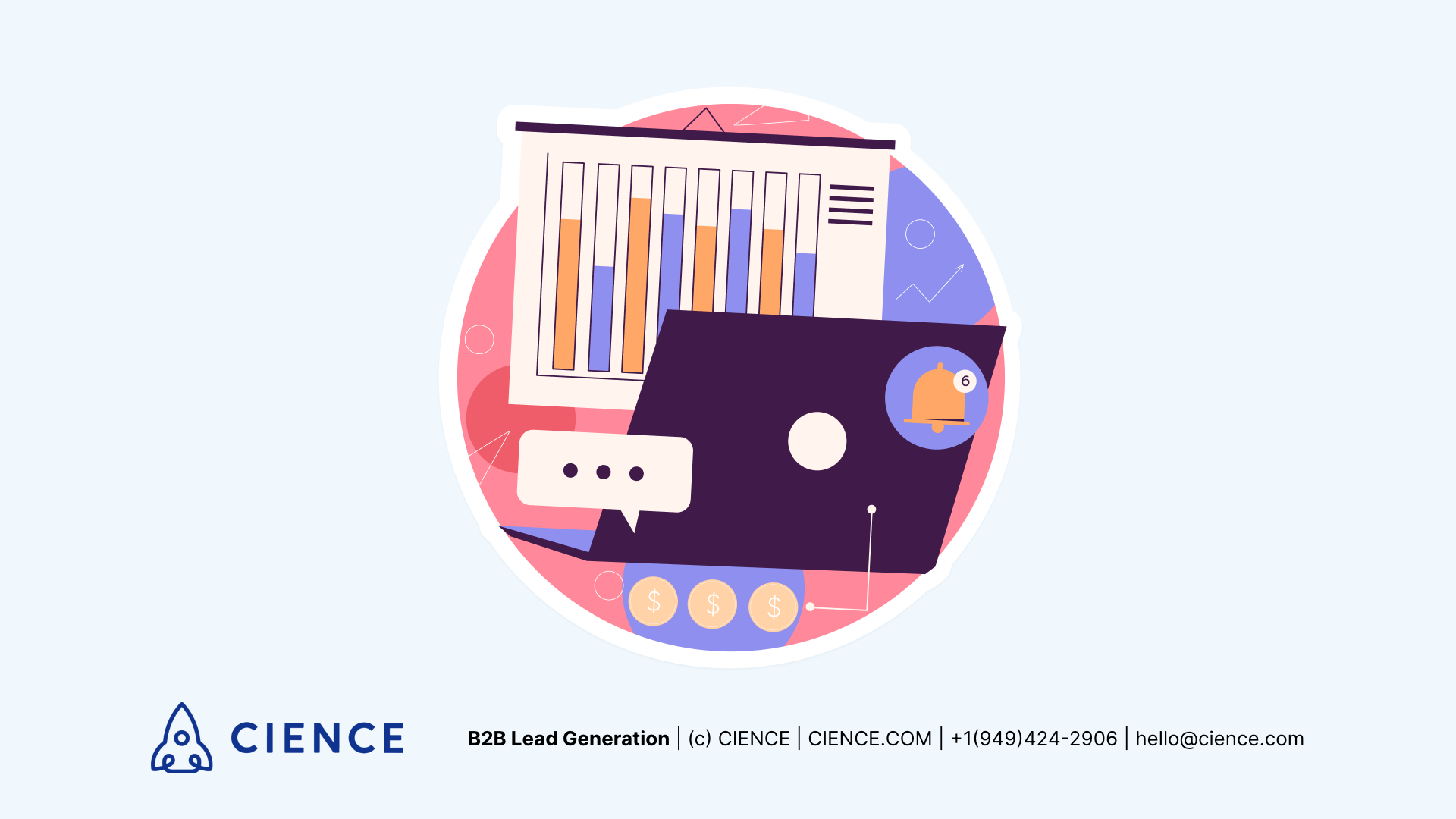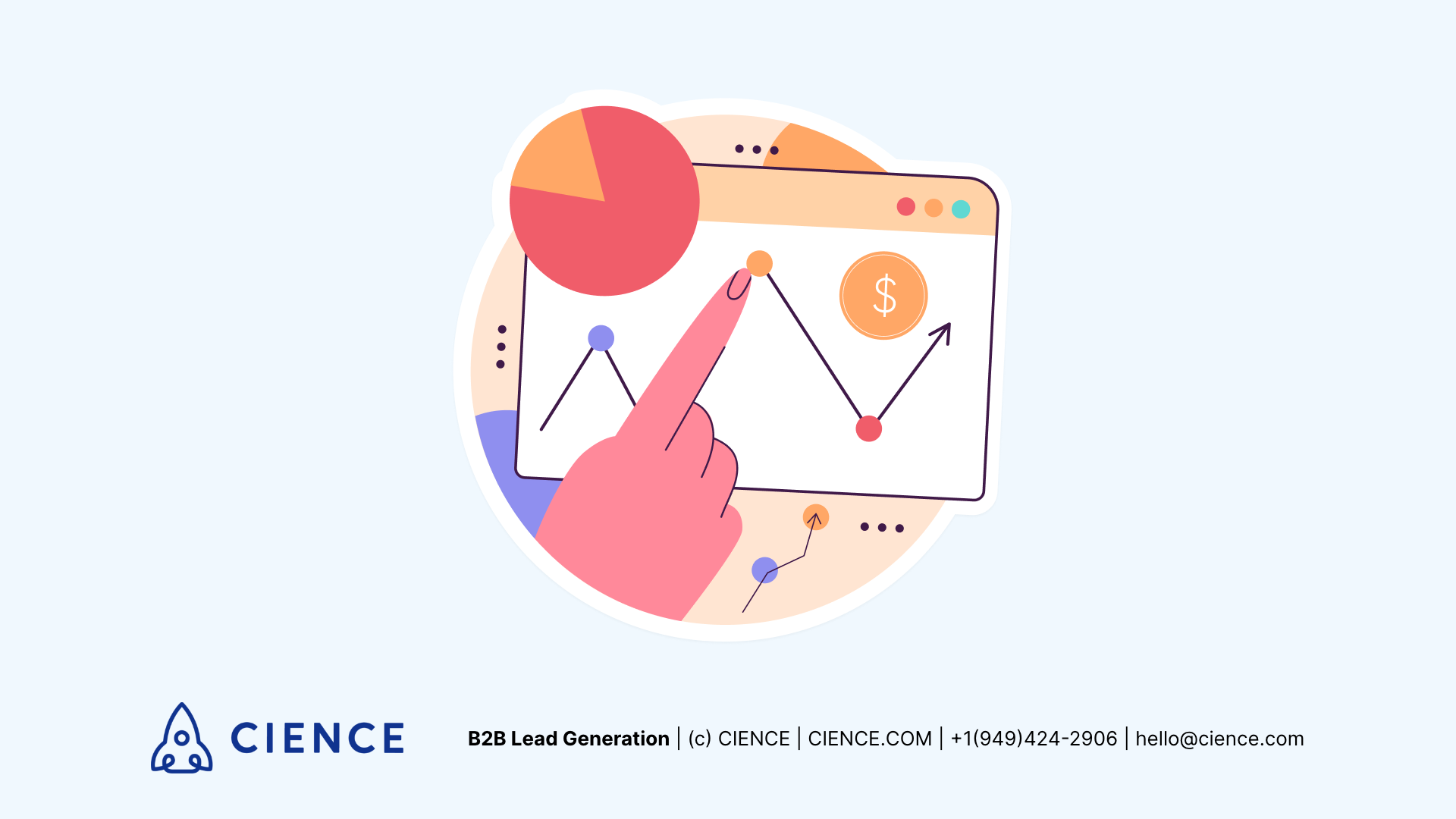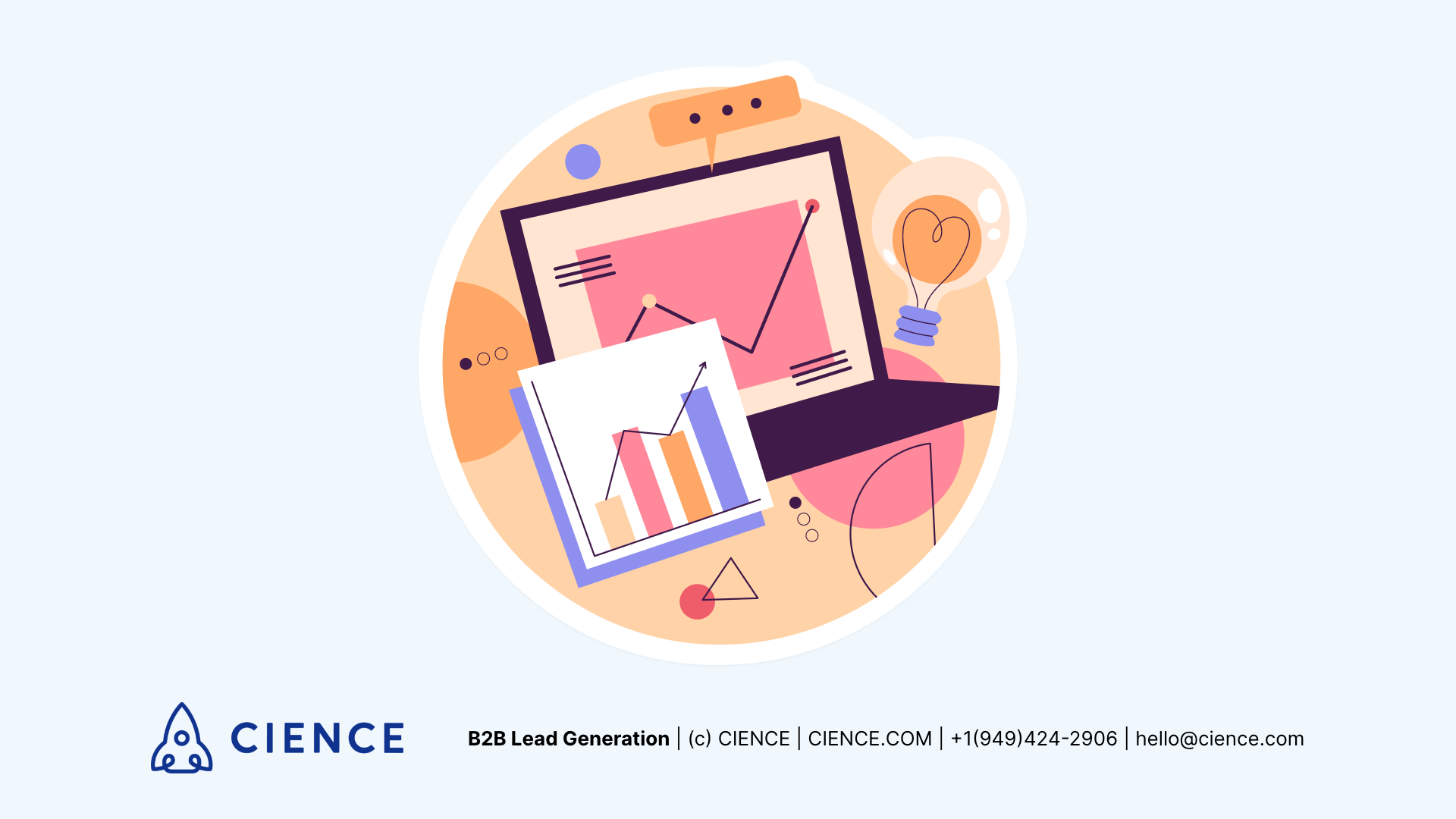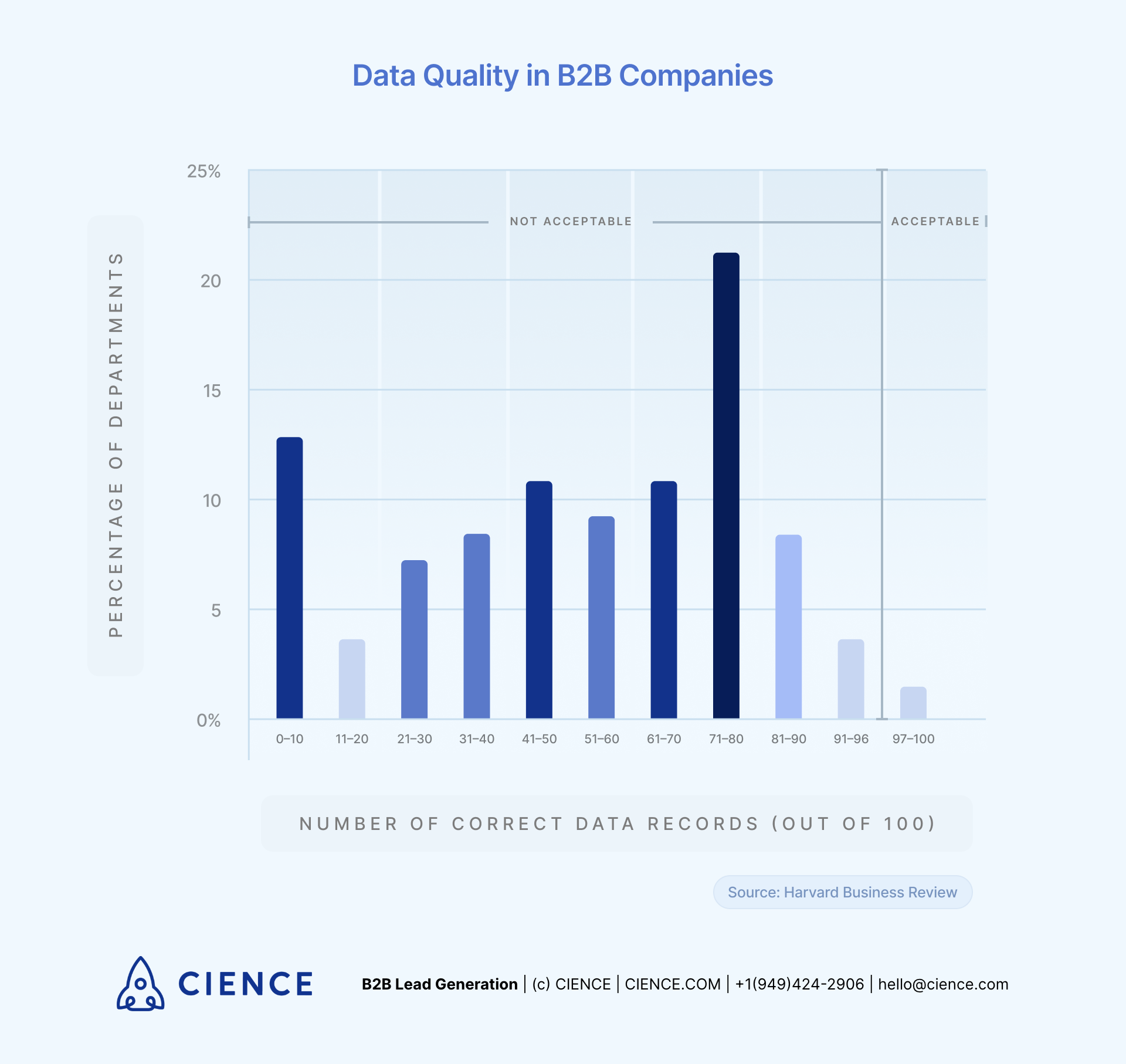There have been a couple of issues which have brought about a revolution in B2B gross sales over the past fifty years: chilly calling facilities, the invention of the web, and entry to knowledge. If the primary couple of improvements appears to be usually accepted and extensively used, the final one wants a bit extra clarification.
Every individual on our planet generates 1.7 MB of information each second of the day. This is the same as storing 850 pages of a ebook every second. This overwhelming quantity of data individuals willingly go away behind when browsing from one web page to a different on-line has an enormous nonetheless unrevealed potential for B2B organizations.
Backed with the right knowledge, corporations can handle their viewers extra effectively, construct a customer-centric gross sales pipeline, and enhance their enterprise operations drastically. The important thing to success right here is gaining access to high-quality knowledge, which could be both static or dynamic.
If the static knowledge kind is already well-established within the B2B business, dynamic knowledge is considerably of a brand new idea. To establish the strengths and weaknesses of every of those knowledge sorts, and discover out which one is best to make use of in B2B gross sales, we first want to present a transparent definition of each static and dynamic knowledge.
What Is Static Knowledge?
Static knowledge is any sales-related info that doesn’t change over time and is saved within the format it was initially recorded. In different phrases, static knowledge consists of something that was collected at a sure level prior to now, and, thus, it doesn’t essentially mirror the true state of issues within the current. Static knowledge could be manually up to date for increased accuracy, however its format total stays the identical.
Nice examples of static knowledge in B2B are annual experiences, firm analysis, shows, and so on. These sources retailer a lot of insights that may assist enhance enterprise operations. Nonetheless, as soon as static knowledge is revealed, it will get solely older and fewer related, until there’s a individual appointed to manually replace it.
 What Is Dynamic Knowledge?
What Is Dynamic Knowledge?
Dynamic knowledge is any sales-related enter that updates routinely to current essentially the most correct knowledge in real-time. As soon as a change happens, the entire dataset transforms as effectively, avoiding the issue of utilizing outdated info. With dynamic knowledge, you possibly can make certain that all of the decision-making processes are made in accordance with the newest accessible data, which helps to conduct enterprise operations rather more effectively.
An instance of dynamic knowledge is the Google Analytics device which presents you recent insights into the web site visitors. As for a extra sales-related instance, some buyer relationship administration instruments (CRMs) assist dynamic knowledge assortment as effectively.
Variations Between Static and Dynamic B2B Knowledge
As a rule of thumb, static and dynamic knowledge include the identical knowledge factors on the prospects: their identify, electronic mail, cellphone quantity, job title, firm measurement, business, and so on. Nonetheless, the similarities between these two knowledge sorts finish right here. Static knowledge vs. dynamic knowledge have three key variations:
1. Sorts of knowledge collected
The primary most evident distinction comes out of the definition: Static knowledge data static information, whereas dynamic one collects dynamic knowledge. You’ll be able to attempt to make static knowledge extra dynamic by continually updating it, however the second you refresh the web page, your dataset will already be outdated.
2. Methods of amassing the info
It’s believed that static knowledge is less complicated to gather as this job is normally executed manually by the staff members or third-side events. It is sufficient to have a sure supply of data (like a prospect”s LinkedIn profile, or firm’s web site web page, for instance) and report the whole lot value noting right into a common desk. As soon as sufficient info is acquired, these recordings could be analyzed and used to make additional decision-making processes.
Dynamic knowledge assortment, quite the opposite, is absolutely automated. As B2B gross sales isn’t nearly knowledge assortment however requires completely different actions to be carried out each day, manually updating the dataset appears merely poor. Due to this fact, dynamic knowledge is normally collected with the assistance of CRMs or different machine studying gross sales software program. As soon as it’s arrange, it doesn’t actually require a lot consideration for knowledge acquisition.
3. Objective of information assortment
Static knowledge is usually used for analyzing issues that occurred prior to now however are nonetheless legitimate for making enterprise choices right this moment. As an example, an inventory of leads contacted over the past quarter may help work out what prospects transformed greater than others and what channels carried out the very best.
Dynamic knowledge, attributable to its fast response to any slightest adjustments within the dataset, is most insightful for locating instantaneous options to current points. On a regular basis questions like “Which prospect to contact subsequent? What channel to decide on for outreach on this specific business? At what time to ship the follow-up electronic mail?” and others could be simply answered with the assistance of dynamic knowledge.

Static vs. Dynamic Knowledge Construction
The information construction is a approach of storing and executing the collected info. It may be strictly fastened or fairly versatile, relying on your small business’s preferences and priorities.
Thus, the static knowledge construction is normally quite simple, consisting of a hard and fast variety of columns and rows, that are determined upon by the staff. The dimensions of the complete dataset is at all times the identical, even after updating it. When working with any such knowledge, the researchers normally know the precise variety of pages, LinkedIn profiles, circumstances they should undergo, and the classes of data they should execute.
With dynamic knowledge construction, nothing is fastened. The quantity of information factors to gather is normally unknown. The one factor you possibly can have management over is indicating the utmost reminiscence measurement of the dataset with a view to keep away from reminiscence collision. The dynamic knowledge construction wants to stay versatile to have the ability to remodel the dataset in keeping with the newest adjustments in real-time. The dynamic knowledge can each develop in measurement if extra info will get collected and in addition shrink if sure enter turns into outdated.

Why Is Dynamic Knowledge Higher for B2B Gross sales?
Though many corporations nonetheless accumulate static knowledge, on the subject of gross sales operations, dynamic knowledge is the long run. Within the battle between static vs dynamic knowledge in B2B gross sales, the latter one is an apparent chief for a lot of causes. Listed here are a couple of most essential ones:
1. Entry to high-quality knowledge in real-time
Knowledge high quality is a decisive issue that determines the success of the complete data-driven gross sales technique. With incorrect info, corporations usually tend to lose a buyer, conduct inefficient outreach campaigns, and even significantly hurt their fame.
In line with Harvard Enterprise Assessment analysis, 47% of information data have a minimum of one crucial (e.g., work-impacting) error, and solely 3% of it may be rated as “acceptable.”

These findings solely verify how exhausting it truly is to take care of a high-quality knowledge gathering. As static knowledge is normally searched and picked up manually, the potential for a human issue error occurring is way increased in contrast with a completely automated dynamic knowledge method.
Furthermore, knowledge hygiene requires a continually up to date database with no outdated info in it. Think about when you have a lead checklist of 10,000 contacts. With static knowledge, it is going to take numerous time and assets to stick with it to the minute. Dynamic knowledge, quite the opposite, will do it for you.
2. Dynamic buyer profiles
Concentrating on related splendid buyer profile (ICP) teams is essential in B2B gross sales. Because the world retains transferring—corporations change to completely different industries, individuals change their jobs, and companies give attention to overcoming completely different challenges—the info you handle to make the important thing strategic choices must mirror these adjustments. Dynamic knowledge provides you entry to the complete image, remodeling your ICP in keeping with the latest state of issues. With static knowledge, you goal the ICP of the previous, with dynamic knowledge—the ICP of right this moment.
3. Higher gross sales and advertising and marketing staff alignment
Each gross sales and advertising and marketing groups work collectively towards the identical ultimate purpose—a increased conversion price. In line with Marketo, their higher alignment can doubtlessly generate over 209% extra income and enhance conversions by 67%.
When an organization makes use of static knowledge, it’s normally distributed between completely different departments individually, which then use it the best way they need. With dynamic knowledge, each advertising and marketing and gross sales groups have entry to the identical dataset, which is concurrently up to date for all departments on the similar time, making the communication between completely different groups simpler to conduct.
Make Dynamic Knowledge Your Resolution for Gross sales
There are nonetheless an enormous variety of B2B corporations on the market who maintain utilizing static knowledge regardless of its apparent disadvantages in contrast with dynamic knowledge. Static knowledge can not fulfill the wants of the continually altering atmosphere corporations exist in right this moment. The immense transformations companies have gone by in the previous few years require entry to recent and up-to-date insights to assist make sensible data-driven enterprise choices. With dynamic knowledge, you possibly can considerably enhance your gross sales operations and assist your staff obtain higher outcomes at a quicker pace.








